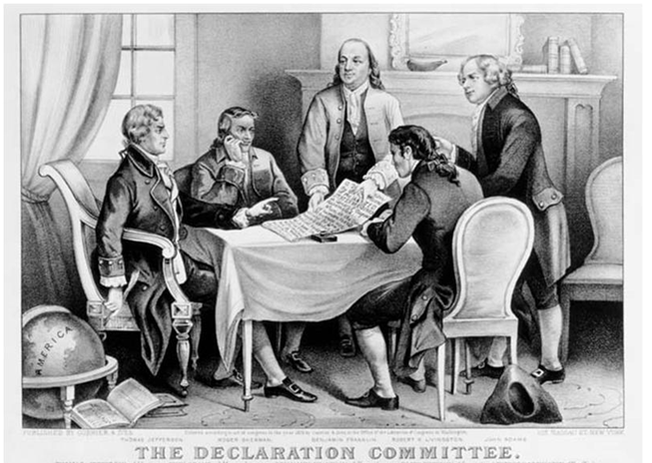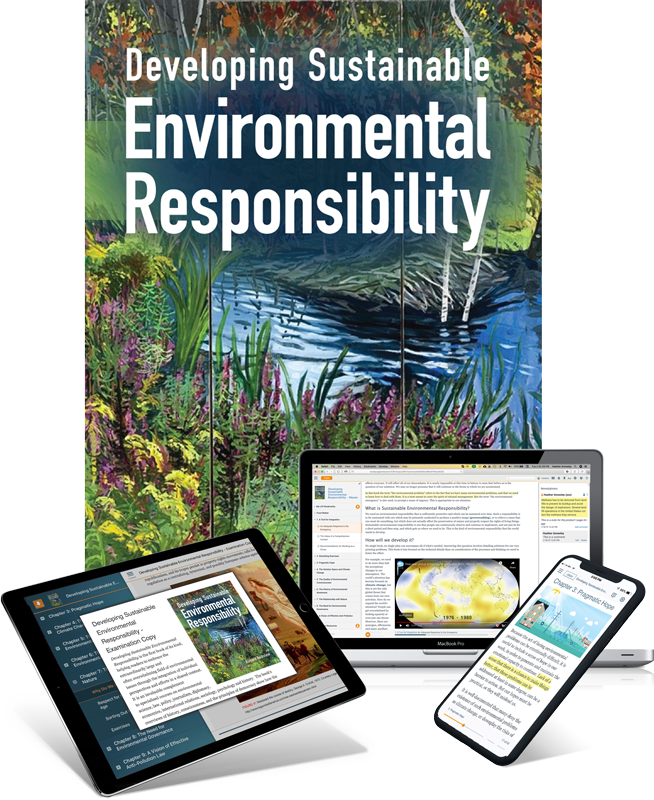Purpose and Context, Activity
Thomas Jefferson, John Adams, Benjamin Franklin, Roger Sherman, and Robert LIvingston, Currier & Ives, 1876. Library of Congress.
The Declaration of Independence articulates the reasons for separating from the rule of the King of England out of a “decent respect for the opinions of mankind”. The Declaration at the emergence of the first stable modern democratic republic expressed the essence of democracy itself, which holds the possibility of social organization that protects the world itself. Respect for the existence and opinions of others makes possible the formation of a working community of necessarily diverse interests, and it is in respect for living things other than ourselves that the saving of the natural world begins.
The proclamation of the basic concept of respect implies a collective social responsibility that also preserves individual freedom. In contrast, fractious partisan struggles, the “zero-sum” or “winner-take-all” political game in which one side seeks to prevail over the other, threaten our chances – tenuous at best - for peace, prosperity, the shared freedom we need to discover what we each can be, and for many, survival.
The proclamation of the basic concept of respect implies a collective social responsibility that also preserves individual freedom. In contrast, fractious partisan struggles, the “zero-sum” or “winner-take-all” political game in which one side seeks to prevail over the other, threaten our chances – tenuous at best - for peace, prosperity, the shared freedom we need to discover what we each can be, and for many, survival.
The degradation of respectful engagement leads to the loss of the ability to manage common issues, which are far larger than those that divide us. Each citizen needs clean air and water and access to the means of survival, which all come from nature. Each citizen has a vitally important shared interest in protecting the environment. Letting differences over how this is done interfere with addressing this commonality will be considered ludicrous by future generations not under the spell of today’s illusions. A decent respect for the opinions and needs of the other side would begin to rectify the procedural dysfunctions impeding substantive progress.
Instead of removing environmental protections, we could have improvement in environmental regulations. Imagine chemical companies treating with respect appeals to lessen the toxicity of their products (some have), and environmental groups supporting the reform of regulation so that they are less burdensome (some have). Many on both sides do listen. The destructive struggle against the other that now dominates the world is not the only politics available to us. The cultural war must be understood as harmful. Environmentalists and the greener, more responsible businesses who listen to them further the cause of world preservation. We should pay attention to the constructive engagement that does happen.
James Kloppenberg’s magisterial Toward Democracy (Oxford Univ. Press, 2016) begins with the story of one such voice, Michel de Montaigne of the 16th century, who turned to cooperation two violent situations by displaying humility, respect and trust, and whose writings helped make respectable the admission of uncertainty in a time when authorities demanded specific belief. The elevation of reason we call the Enlightenment has only been a counterforce, not a replacement, for the tribalism that still darkens the world, but it provides the liberating recognition of universality. The mutuality, the reciprocity between each citizen that flows logically from the recognition of equality, was an animating idea long before the American Revolution. It is a political application of the Golden Rule.
In theaters across America today movie-goers can see Will You Be My Neighbor, and appreciate the deep meaning of the empathy and respect that television pioneer Mr. Rogers gave to millions of children and everyone else. We can find on Youtube today the original video of Aretha Franklin singing “R-E-S-P-E-C-T”, and some will remember it was written by the great Otis Redding, who also wrote “Try a Little Tenderness”. It is by such human sentiments – the “better angels of our nature” that Lincoln referred to, that great societies, capable of managing themselves and their problems, are maintained, and potentials reached.
The July 8, 2018 New York Times Sunday Magazine account of the ending of wolf-researcher Rob Wielgus’ work in the Northwest is instructive. There was anger on both sides. Wielgus is said to have “attacked” a rancher by name in the news, and the reporter was told “more than once” that protecting wolves is symbolic of “Big Government and regulation and all the ways that distant bureaucrats and coastal elites want to destroy the cherished rural ranching culture of the West.” The mission of the Endangered Species Act is to prevent humanity from causing species to become extinct, lost forever, not to destroy anyone’s culture. Intemperate statements by scientists are not a reason to ignore their findings, which in this case have showed the value of deterrence. Investment in a “strategic array of nonlethal deterrents” – dogs, increased human presence, fences, can bring about significantly lower losses of livestock to wolves, and reduction or elimination of the need to kill wolves to protect the interests of ranchers. Without respect for each side of a debate, feasible, available solutions go unnoticed.
Environmentalists wishing to contribute to the preservation of nature should do their work with a firm recognition that what stands in our way is not the absence of solutions, but the absence of the will to find and implement them. Saving the wolves – and other important parts of our natural ecosystem - involves dispelling myths born of misplaced resentment. A decent respect for the opinions of others began our experiment in democracy, and requires refreshment.
Instead of removing environmental protections, we could have improvement in environmental regulations. Imagine chemical companies treating with respect appeals to lessen the toxicity of their products (some have), and environmental groups supporting the reform of regulation so that they are less burdensome (some have). Many on both sides do listen. The destructive struggle against the other that now dominates the world is not the only politics available to us. The cultural war must be understood as harmful. Environmentalists and the greener, more responsible businesses who listen to them further the cause of world preservation. We should pay attention to the constructive engagement that does happen.
James Kloppenberg’s magisterial Toward Democracy (Oxford Univ. Press, 2016) begins with the story of one such voice, Michel de Montaigne of the 16th century, who turned to cooperation two violent situations by displaying humility, respect and trust, and whose writings helped make respectable the admission of uncertainty in a time when authorities demanded specific belief. The elevation of reason we call the Enlightenment has only been a counterforce, not a replacement, for the tribalism that still darkens the world, but it provides the liberating recognition of universality. The mutuality, the reciprocity between each citizen that flows logically from the recognition of equality, was an animating idea long before the American Revolution. It is a political application of the Golden Rule.
In theaters across America today movie-goers can see Will You Be My Neighbor, and appreciate the deep meaning of the empathy and respect that television pioneer Mr. Rogers gave to millions of children and everyone else. We can find on Youtube today the original video of Aretha Franklin singing “R-E-S-P-E-C-T”, and some will remember it was written by the great Otis Redding, who also wrote “Try a Little Tenderness”. It is by such human sentiments – the “better angels of our nature” that Lincoln referred to, that great societies, capable of managing themselves and their problems, are maintained, and potentials reached.
The July 8, 2018 New York Times Sunday Magazine account of the ending of wolf-researcher Rob Wielgus’ work in the Northwest is instructive. There was anger on both sides. Wielgus is said to have “attacked” a rancher by name in the news, and the reporter was told “more than once” that protecting wolves is symbolic of “Big Government and regulation and all the ways that distant bureaucrats and coastal elites want to destroy the cherished rural ranching culture of the West.” The mission of the Endangered Species Act is to prevent humanity from causing species to become extinct, lost forever, not to destroy anyone’s culture. Intemperate statements by scientists are not a reason to ignore their findings, which in this case have showed the value of deterrence. Investment in a “strategic array of nonlethal deterrents” – dogs, increased human presence, fences, can bring about significantly lower losses of livestock to wolves, and reduction or elimination of the need to kill wolves to protect the interests of ranchers. Without respect for each side of a debate, feasible, available solutions go unnoticed.
Environmentalists wishing to contribute to the preservation of nature should do their work with a firm recognition that what stands in our way is not the absence of solutions, but the absence of the will to find and implement them. Saving the wolves – and other important parts of our natural ecosystem - involves dispelling myths born of misplaced resentment. A decent respect for the opinions of others began our experiment in democracy, and requires refreshment.
Activity: Pick an environmental issue where on one side there are people concerned about harm to public health or the environment, and on the other side there are people who want to preserve the economic benefits of the activity that causes the harm. Imagine a process that will find the best balancing of interests using a "strength scale" for compromise, where the strongest compromise is the one that best satisfies each side. How can the needs and concerns of each side be examined and weighed to produce the result that will garner the widest support?

 RSS Feed
RSS Feed

